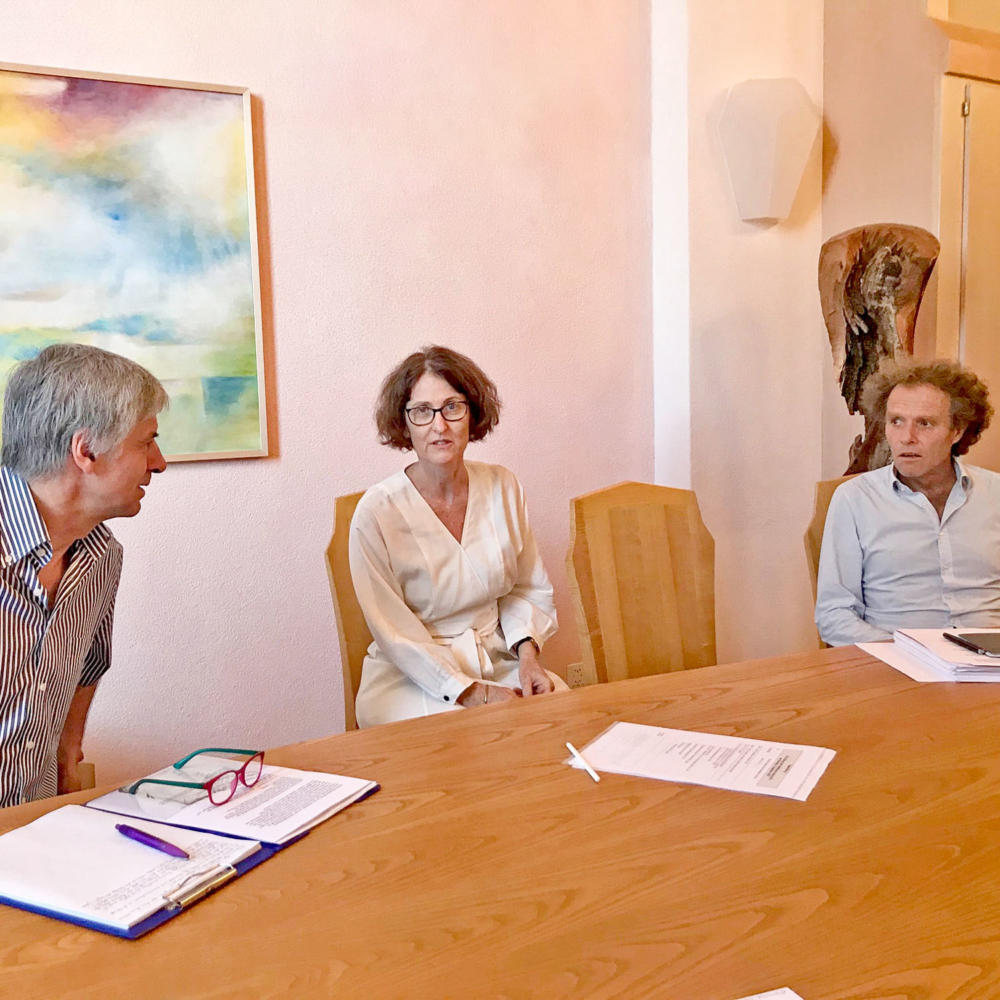Working together in times of social isolation
The Goetheanum Leadership held their autumn retreat from 31 August to 2 September both in France and at the Goetheanum, with different focal points: the current situation and its consequences for the anthroposophical work, meeting with members in France, professional esotericism, initiatives and operational questions.
The September retreat began in the Alsace (FR), in an organization for curative education, Beubois, which is well recognized, not only in France. The location of our meeting venue, close to Colmar, allowed us to visit the Isenheim altarpiece at the beginning of our retreat: its central motifs touch on questions of human development against the background of the Mystery of Golgotha.
Healing effect of meditation
The altar does not only speak of human transformation, but actually affects the healing processes in the diseased who have sought it out at all times, past and present. Our spiritual development is therefore connected with our healing forces – a relationship that inspired us to work on questions of professional esotericism.
The meditative path of knowledge also has a healing effect; its Michaelic quality, which seeks to guide the spirit in us to the spirit in the cosmos, is complemented by the quality of Raphael who works in a health-giving way through the spirit.
The content of our work therefore shifted to a new focus. Last year the Michaelic attitude was at the centre, now it is the Michaelic path of knowledge in Anthroposophy and the way it relates to our everyday activities and working life.
We know the exercises that we can individually work with: Rudolf Steiner described them in How to Know Higher Worlds (GA 10). Then there are specific paths of inner development for professional groups, such as physicians, curative teachers, nurses, teachers and priests. These meditations can deepen the practical work and make it more effective. According to Rudolf Steiner, it is only through these comprehensive meditations that physicians can develop “in their soul the forces that can unfold a therapeutic effect” (GA 316, lecture of 5 January 1924).
Ethical-spiritual qualification
Our work is not only based on external qualifications, it also needs an ethical and spiritual dimension. Healing, for instance, does not only ask the scientific question as to the effectiveness of medicine, but also a moral one that asks what is good for the patient.
While the meditations given for the different professions are not only for us as individuals but as members of professional communities, the path of knowledge pursued in the First Class of the School of Spiritual Science has a wider dimension: it unfolds its effect down into the practical life and can bear fruit for humanity as a whole.
In the final year of his public activity, Rudolf Steiner also planted seeds for an inner, esoteric cooperation of different professional groups and Sections. There are, for instance, meditations that connect teachers and physicians; and an entire lecture cycle is devoted to the working together of priests and physicians (GA 318). Entering into these questions of the meditative path of knowledge is especially important at this time of growing virtualization and social distancing; in times of external isolation we can, with its help, form inner connections and build bridges, because Anthroposophy “will only grow on the ground of human solidarity” (GA 211, lecture of 11 June 1922).
Choosing the Alsace as a meeting place made it possible to invite members of the General Anthroposophical Society of that region to join us at the beginning of our retreat. We discussed many issues related to the situation of anthroposophical initiatives in France today and aspects of the Covid-19 pandemic.
Different perspectives on Corona
The pandemic was one of the main topics during the whole of the retreat. Looking from the perspectives of the different Sections we collected aspects on the pandemic and agreed on further steps that will continue on from the book we recently published (Anthroposophy Worldwide 7-8/2020). One suggestion was to livestream a series of lectures that deal, from different perspectives, with the current situation and the pandemic.
We looked back with much gratitude to the wonderful Faust performances at the Goetheanum: Andrea Pfaehler, Eduardo Torres and Nils Frischknecht visited us during the part of the retreat that took place in Dornach and they and Stefan Hasler gave an account of their experiences and impressions. Both sides expressed their appreciation and gratitude for this successful project which made it possible to present a major theatre performance at a time of cultural lockdown. While the text was abridged, the synthesis of theatre, speech, eurythmy, music, stage, costumes and lighting resulted in an impressive Gesamtkunstwerk that allowed the audiences to profoundly experience the dramatic journey of Faust’s soul.
As the Goetheanum Leadership we look back on days of intensive work and we look forward, filled with hope, to the challenges that lie ahead.
Florian Osswald and Matthias Girke, Goetheanum Leadership spokespersons

